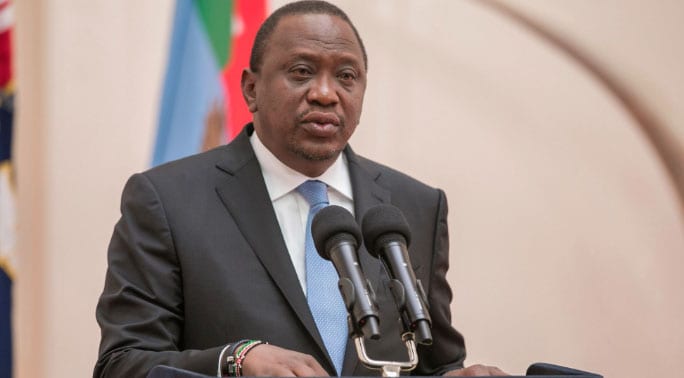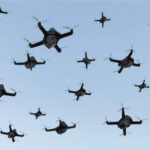Kenyans head to the polls on August 9, just two weeks away. Only one of the four candidates jostling for Uhuru Kenyatta’s seat would eventually wear his crown. It must be a very different life for Uhuru who, at 60, is no longer eligible to be Kenya’s president having served the two terms permitted by the constitution. Kenyatta was literally born into the presidency. His father was the pioneer political leader of Kenya and remained. That means he was raised in State House because his father served as president from independence until his death in 1978.
William Ruto, Uhuru’s deputy is one of the four candidates hoping to take over from Uhuru. He has been the latter’s deputy president since 2013. Together they went to trial over the 2007 election violence at Den Haag! But the romance between the two has soured since an anti-corruption enquiry indicted two of Ruto’s political allies. The Jubilee Coalition broke down irretrievably when Uhuru accused his deputy of campaigning before electioneering season.
Just as Muhammadu Buhari refused to openly endorse Vice President Yemi Osinbajo at the last presidential primaries, Uhuru declined the endorsement of his deputy as his successor. Instead, he appeared to pitch tent with his family’s age-old archrival Raila Odinga.
It is true what they say in politics, that there are no permanent friendships, only pecuniary interests. In Kenya, not even a marriage sealed by the commonality of faith has endured time.
Kenya is a predominantly Christian nation and both William and Uhuru profess the same faith. Nevertheless, the blood of Jesus could not seal the romance between the born Catholic and his born-again Pentecostal deputy. This must be a good argument for those who are obsessed with the ruling party’s Muslim-Muslim ticket in Nigeria. Religion hardly means much to politicians.
Kenya and Nigeria share similar history since the British colonised them both.
While Nigeria’s pioneer leaders negotiated the country’s flag independence over coffee at Lancaster House, Kenya’s patriots went into the bush in an attempt to chase down their colonial overlords. It was that push that advanced the subsequent Lancaster tea talks culminating in its independence in 1963 – hence the decision by Kenyatta to name his son Uhuru – meaning freedom.
Like Nigeria, there are over 40 ethnic groups in Kenya, but the three dominant ones are the Kikuyu, whose leaders like Nigeria’s political south formed the so-called Mau Mau movement to push the British out. They gained governance superiority as a result. The second largest group is the Luo, who like Nigeria’s Ibos are good with commerce and trade. The last of this troika are the Kalenjin who are predominantly farmers. The others, like Nigeria’s over 300 ethnic nationalities are hardly heard from except in times of ethnic skirmishes.
Kenya is eager to showcase its democratic potentials to the global democracy police. Like Nigeria, its electoral umpire describes itself as independent. A 2007 mismanagement of elections resulted in the disturbance in which more than 1,000 people lost their lives and 600,000 were displaced. International investigation of the role of the two highest office holders, Uhuru and Ruto would send them to the trial and acquittal at Den Haag.
Both leaders respected international rule of law, taking their stand at the ICC court, often accused of unfairly targeting African rulers, rather than hide under their cloak of constitutional immunity from prosecution. It was a proud moment for Kenya, African leadership and the rule of law. All that has now paled in significance now that the two quondam leaders have parted ways.
Although separated by thousands of flying miles, both Nigeria and Kenya have battled insurgency. While Nigeria plays yo-yo with the predominance of religion, it is well established that Muslims make up only 11 per cent of Kenya’s population. Kenya has no homegrown insurgency so to say. Its decision to help out Somalia, its neighbour in its time of need has pushed it into one as the al-Shabab group has made it a target.
Kenya has suffered many casualties and made global headlines in its fight against insurgency. The worst of this was the brazen attack in 2013 on the Westgate Mall in which 68 people died and more than 200 were injured. The siege lasted only a few hours and Kenyan security forces appeared to have been confused in their operation against the onslaught, they seem to have what it takes to keep the country safe.
In Nigeria, the hitherto Buhari’s ‘technical defeat’ of Boko Haram has convinced more deadly groups to put the nation on the world terrorism watch list. From Chibok, Nigeria has witnessed Buni Yadi, ritual killings, kidnapping and series of attacks including a rail attack and the latest – the siege on Kuje Prisons. Prominent insurgency commandoes were released during that attack.
The argument here would be that Nigeria is 1.6 times larger than Kenya and its population of less than 60 million is incomparable to Nigeria’s 280 million. However, to whom much is given, much is expected. Nigerians expect more of its security forces given their successful track record of excellence at international peacekeeping and enforcement operations.
Until now Kenya appeared to lead other African nations in replacing tired bones with youthful leaders who understand the dynamics of governance in a digital generation. All that is set to change if the bookmarkers’ prediction that 77-year-old Raila Odinga is a frontrunner over his younger counterpart, William Ruto who is just 55. Apparently, the British did a better job with birth certificates in East Africa than they did in Nigeria. Most of Nigeria’s past and present rulers are mired in the controversy of age falsification.
Just like their Nigerian counterparts, Kenyan youths that make up 75 per cent of the voting group are disillusioned with politics and politicians. They believe that the outcome of elections have not delivered on the change they desire and have vowed to stay away. However, not until some have rented themselves out as crowds at rallies. The rent-a-crowd enterprise is a lucrative movement in Kenya. In Nigeria, politicians make up for depth of planning and delivery on the dividends of democracy with subterfuge. The ruling party was recently accused of dressing up touts as bishops to feign acceptance for its Muslim-Muslim ticket at next year’s election.
Fact remains that only common interest unites politicians. Uhuru is accused of supporting Odinga to save his post-retirement future. The ruling party in Nigeria hopes it would win the March 2023 polls and keep its secret vaults sealed.
The religious card has been hyped in Nigeria, but experience would reveal that when the Who is Who of political cannibals is compiled, both religions would have enviable representation. While the hoi polloi destroy fraternal friendships over a Muslim-Muslim ticket, market forces make no such distinction.
The prices of commodities have never been skewed in the favour of any religion. Bureau-de-change operators never give rebates to adherents of one faith over another while exchanging the weakened naira for the dollar. This is why voters should grow over and beyond the spilt milk items of region and religion and put competence over and above every other consideration. Here’s hoping that happens in Kenya and later in Nigeria.

 Join Daily Trust WhatsApp Community For Quick Access To News and Happenings Around You.
Join Daily Trust WhatsApp Community For Quick Access To News and Happenings Around You.


